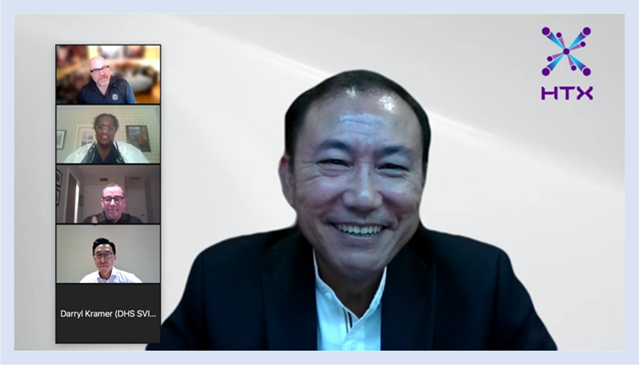
ON 18th September 2021, HTX was invited by the United States’ Department of Homeland Security (DHS) to be a panellist at the 2021 inaugural Silicon Valley Innovation Program Demo Week*, to exchange the operational insights gained from managing the Covid-19 pandemic with our international counterparts and discuss how countries can leverage Science and Technology (S&T) to prepare for the future pandemics.
The US DHS is one of HTX’s key partners. Since HTX’s inception, HTX has been actively strengthening its relationship with the DHS and its agencies, including exchanging operational insights and experience in managing the pandemic.
Building on this collaboration, the DHS had invited HTX’s Deputy Chief Executive (Operations) Chen Yeang Tat to represent HTX in the international panel“Global Perspectives on Pandemic Future Proofing”.
The panel was focused on the key public safety lessons learnt by countries during their management of the pandemic. Apart from HTX representing Singapore, in attendance were representatives from the Republic of Korea, New Zealand, and the US’ Emergency Medical Services (EMS).
In the panel, DCE(O) shared how HTX’s insights from our work at the borders, enforcing circuit breaker measures and transporting infected personnel from the borders to medical facilities.
Please click here to watch the video playback of the panel discussion or read on to find out DCE(O)’s responses to the questions posed to the panellists.
DCE(O)’s responses to the SVIP panel questions
Question 1: What are some best practices HTX would carry into any pandemic or health crisis response in the future?
DCE(O) highlighted three best practices that HTX would carry into future crises.
The first is to adopt a whole-of-government approach to coordinate the efforts of all government agencies to share resources and solutions to tackle a national problem.
“In Singapore, we recognise that no single agency has enough resources to deal with a pandemic or health crisis alone. An innovative solution conceived by one government agency can find its use in another agency,” he said.
He then gave the example of how HTX, in collaboration with other government agencies, adapted digital apps and an existing wristband to be paired with an IoT device, so that immigrations officers can use it to monitor thousands of returning citizens, permanent residents and pass holders serving their Stay-Home Notice.
The second best practice he shared was to continue building on our multi-disciplinary core expertise.
“In peacetime, we need to build on our core capabilities, and during crises, we need to have the capacity to check against assumptions as information is still being gathered,” he said.
He shared that in HTX, there are 1,500 engineers and scientists, specialising in more than 15 technological domains. With the deep expertise that HTX had, we were able to challenge pre-existing information that health ministries held; In particular, the idea that only symptomatic people are infected with the virus. Checks by HTX found that asymptomatic persons were also infected and could spread the virus to others, which led to the Government tweaking Singapore’s pandemic response to stop the spread.
Finally, DCE(O) shared that HTX’s partnerships with the industry is crucially important.
“I think it is our partnerships with the industry that allowed us to develop and fine-tune our test kits, and also in our deployment of robots that helped our frontliners on the ground,” he said.
Question 2: What were some of the challenges HTX saw that needed to be considered when preparing for a future crisis?
DCE(O) shared three challenges that HTX faced, namely: the supply chains for our frontliners being severely tested, over-reliance on contractor support, and the resilience of the workforce.
During periods of lockdown, HTX’s developments were stalled due to the supply chain disruption that hampered the arrival of equipment.
“The lesson learnt was really to diversify our sources of supply, and look into local production and stockpiling measures,” said DCE(O).
Another challenge faced was that many of the Home Team’s assets were maintained by vendors. This reliance on contractor support to upkeep our systems could potentially threaten the readiness and availability of our operational assets.
Lastly, when the pandemic drags on, the Home Team’s frontliners can be both physically and mentally exhausted by the workload demanded of them.
“We need to think ahead to enable a more mobile workfoce that is equipped by good decision-support tools – analytics that can alleviate their cognitive workload,” he said.
Question 3: What technology would HTX like to have for the next pandemic?
DCE(O) replied that pervasive and persistent bio-surveillance sensors that can detect the virus at the borders would be key.
Additionally, he highlighted the need for technologies that sanitizes large areas effectively and efficiently.
“These are technologies that would keep travellers at our borders as well as our frontline workers safe,” said DCE(O).
Closer collaboration
HTX’s participation in the panel was well-received, with the moderator commenting that DCE(O) had provided an operational perspective, which was a very important aspect for the DHS’ mission. The DHS SVIP Director also extended her gratitude to HTX for the valuable insights and perspectives that Singapore had offered which were unique from the rest of the panelists.
Through events like the SVIP, HTX hopes to continue our strong partnership with the DHS, glean from their strong culture of innovation, and create bigger and better S&T solutions to force multiply our Home Team and future-proof Singapore’s safety and security.
*The United States’ Department of Homeland Security’s (DHS) Silicon Valley Innovation Program (SVIP) is an established programme that enables the DHS to tap on early innovations that come out of Silicon Valley, fund selected projects, and adapt them for public safety. The SVIP Demo Week is a virtual event that aimed to showcase 26 innovative technology demonstrations by start-ups and how these start-ups have adapted their commercial products through SVIP funding.
Each day of the Demo Week had a different theme – aviation security, blockchain, border & maritime security, and COVID-19. These themes comprised an opening keynote, demos by the start-ups, and an expert panel. The day of the panel was attended by 180 unique attendees from 8 countries (72% from the US, 17% from Singapore, 3% from Canada and one attendee each from Germany, India, Qatar, Taiwan and the UK).

